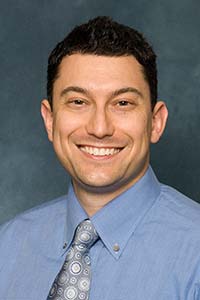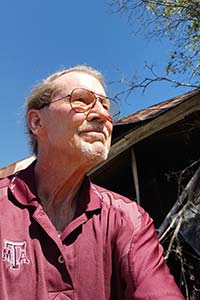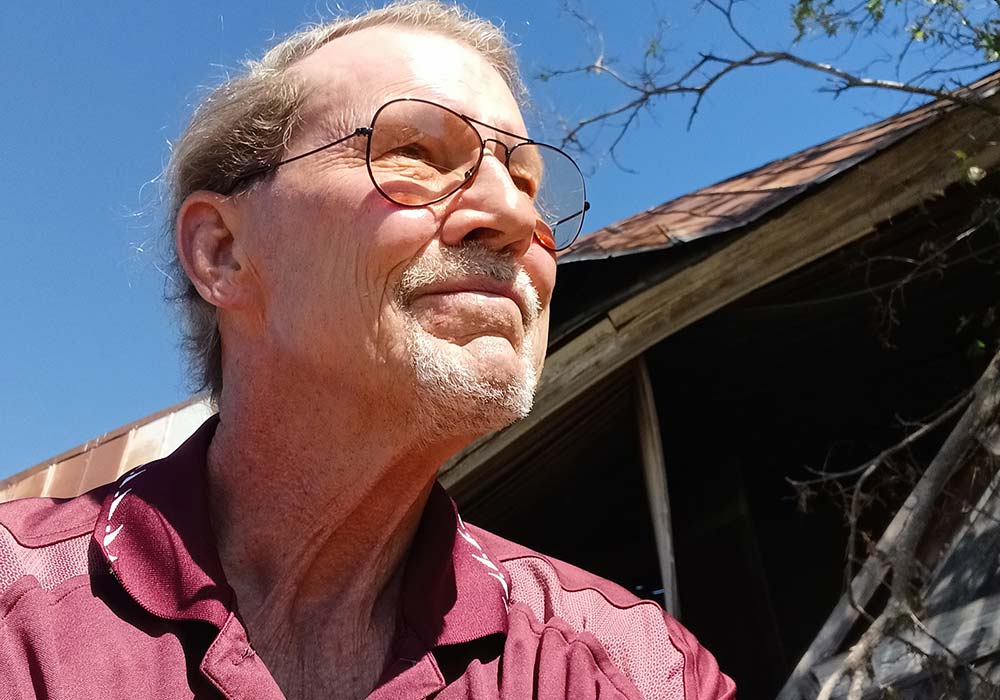Mike Rasnick, 64, was born and raised in Houston. School bored him. He couldn’t wait to get home each day, jump on his horse, grab his pellet gun, and head to the creek. After graduating high school, he found himself in and out of what he called various “situations.”
Mike ran his own carpet-cleaning business and didn’t really ever consider the need for health insurance. “I thought I was bulletproof,” he says. “It was a foolish assumption.” Over the past 20 years, Mike has been diagnosed with three different forms of cancer.
It Appeared Almost Overnight
In the spring of 2000, Mike woke up with what he described as small pimple-like objects on the palms and backs of his hands. “It appeared almost overnight,” he says. “I was also itchy, almost to the point that I was cutting my skin, along with sweating profusely, and constantly out of breath. I was so tired. It took me five minutes to put my shoes on.”
Because he didn’t have health insurance, accessing consistent care was a challenge. He received different and, ultimately, incorrect diagnoses.
“All these doctors kept telling me it was allergies, contact dermatitis, or eczema. But in my head, I knew it was something more and was starting to become quite depressed about my situation.”
Eventually, he was referred to yet another physician in the Houston area who diagnosed Mike with cutaneous T-cell lymphoma (CTCL). A rare disease, CTCL typically involves the skin and is seen primarily in men who are in their 40s, 50s, and 60s. There is no cure for CTCL.
Mike underwent several therapies and participated in clinical trials to address his CTCL. “Nothing brought me any relief until I received total skin electron therapy,” he says. He received this treatment five days a week for two and a half weeks, along with oral chemotherapy.
After the 11th session, Mike says, “It was like someone flipped the switch. The constant itching just stopped, and it felt like this whole thing never happened.”
However, the effects of CTCL had already taken a toll on Mike. “CTCL has destroyed my body,” he says. “It stole my ability to do all sorts of things I loved, especially being outside.” Due to CTCL, Mike can’t expose his skin to the sun. “Even minimal exposure makes the itching start up,” he says.
A spot was detected on his lung
After moving from Houston to the Austin area, Mike was introduced to Texas Oncology for follow up care, and his cancer journey soon took another unwanted turn.

Texas Oncology–Georgetown
and Round Rock North
In 2015, Mike began seeing Bartlomiej (Bart) Posnik, M.D., hematologist and medical oncologist at Texas Oncology–Bastrop, for regular checkups.
Around the beginning of COVID-19, Mike wasn’t feeling well, so he visited a local hospital where he was tested for the virus. A chest x-ray revealed a spot on his right lung. He began getting a CT scan every six months to monitor the spot for possible growth.
In 2021, Mike moved to Jarrell, Texas, and began seeing Krishna Patel, M.D., hematologist and medical oncologist at Texas Oncology–Round Rock North, who was monitoring his CTCL and keeping an eye on the spot on his lung. One evening in October 2022, Mike experienced serious gastrointestinal issues and went to the ER at a local hospital. Test results showed that the spot on his lung had grown to four times its original size.
A biopsy in January 2023 confirmed that Mike had squamous cell carcinoma – lung cancer – of the right lower lobe of his lung.
A smoker’s lament
“I was shocked, but really I shouldn’t have been,” says Mike. “I smoked cigarettes for 47 years. I have no one to blame other than myself for this lung cancer diagnosis.”
To evaluate the extent of Mike’s cancer, a PET/CT was performed which showed another spot, located in the right upper lobe of Mike’s lung. This was diagnosed as a second and separate form of lung cancer, adenocarcinoma.
“Mike’s case is unusual in that he was noted to have two primaries of two separate histologies in two separate lobes, both of which were confined to their respective lobes and considered stage I disease,” says Dr. Patel.

Texas Oncology–Round Rock North
“Lung cancer is best treated in the multidisciplinary fashion and his case was discussed amongst our colleagues,” continues Dr. Patel. “A plan was made for Mike to undergo lower lobe resection with lymph node sampling.” Mike’s robotic surgery with a thoracic surgeon was performed in February 2023.
For the second form of lung cancer, a 1-centimeter tumor in Mike’s upper lung nodules, his care team recommended radiation therapy. The tumor was buried so deeply that surgery would likely have left Mike with a significant decrease in lung function.
Courtney Sheinbein, M.D., radiation oncologist at Texas Oncology–Round Rock North, oversaw Mike’s radiation treatment for the right upper lung adenocarcinoma.
“Mike was a candidate for stereotactic body radiation therapy, or SBRT, which is a form of radiosurgery and is nearly as effective as surgical resection,” says Dr. Sheinbein. “This treatment gives patients an 85-90% chance of long-term control and success.”
I wouldn’t be alive were it not for Texas Oncology
Despite a complex and challenging triple-cancer saga, Mike’s outlook is remarkably positive.

“Mike’s been followed closely and has not needed chemotherapy or immunotherapy,” says Dr. Patel. “On surveillance imaging he is noted to have no evidence of disease, which is very exciting. His lung cancer will very likely be cured with our approaches. His tumors are also sequenced and, if needed, he has medical therapeutic options available such as targeted therapy, immunotherapy, or more radiation.”
“I wouldn’t be alive were it not for Texas Oncology,” says Mike. “The staff was incredible, and I can’t speak highly enough of them – I am profoundly grateful. They work in unison. literally like working as one. It’s amazing.”
There is a little voice in the back of Mike’s head that says, “I’m still here.” He knows he will always have CTCL, but it is currently in remission. As he reflects on his cancer journey, Mike has defied the odds, being diagnosed with three different types of cancer. “Never lose sight of hope,” Mike says. “There are a lot of people that do survive cancer. Just look at me.”
In 2023, Texas is estimated to have 14,510 new cases of lung cancer and 8,330 expected deaths. For more information, visit TexasOncology.com.


